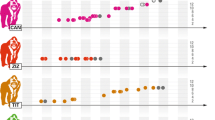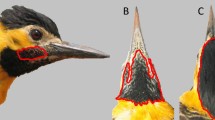Abstract
In a genetic analysis of the mating system of cooperatively breeding Arabian babblers (Timalidae: Turdoides squamiceps), we identified which individuals in the population are breeding, and how reproductive success was distributed among group members with respect to their dominance rank, for both males and females. The population was characterized by an asymmetrical distribution of reproductive success; behaviorally dominant males produced 176 of 186 (95%) of the offspring in 44 social groups analyzed, and alpha females produced 185 of 186 (99.5%). We evaluated models of reproductive skew by examining genetic and demographic correlates of reproduction by␣subordinates. Subordinate (beta) males that sired young were more likely to be recent dispersers from their natal groups or members of newly formed groups than betas that did not reproduce. Breeding beta males had spent smaller proportions of their lives with the current alpha male and female as alphas than had beta males that did not sire young. One consequence of the linkage of dispersal with breeding in newly formed, nonnatal groups is that beta males that sired young had significantly lower genetic similarity to the alpha males in their groups (based on band-sharing coefficients using multilocus minisatellite DNA fingerprinting) than those that did not sire young. This pattern may occur generally in species in which group membership accrues both through nondispersal of young (forming groups of relatives) as well as through dispersal involving coalitions that sometimes include nonrelatives.
Similar content being viewed by others
Author information
Authors and Affiliations
Additional information
Received: 22 July 1997 / Accepted after revision: 5 February 1998
Rights and permissions
About this article
Cite this article
Lundy, K., Parker, P. & Zahavi, A. Reproduction by subordinates in cooperatively breeding Arabian babblers is uncommon but predictable. Behav Ecol Sociobiol 43, 173–180 (1998). https://doi.org/10.1007/s002650050478
Issue Date:
DOI: https://doi.org/10.1007/s002650050478




